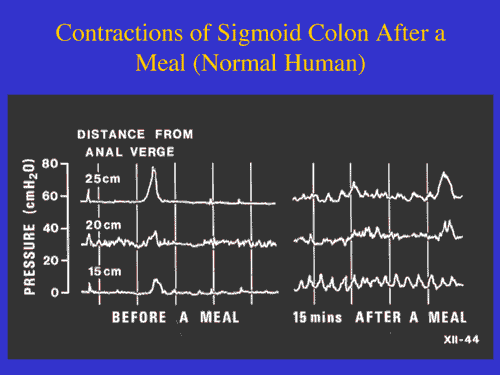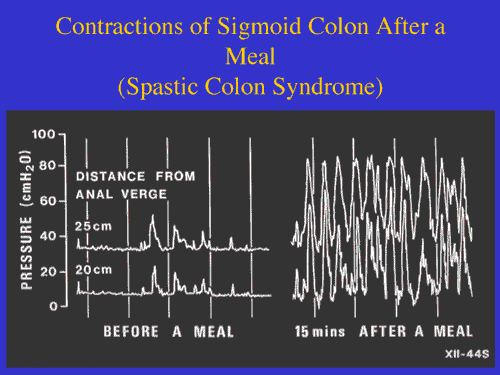Brain Gut Dysfunction & Irritable Bowel Syndrome
Irritable Bowel Syndrome, as defined by the Rome Criteria diagnostic guidelines, is characterized as a brain gut dysfunction.
To date, gut-directed IBS hypnosis is the only treatment researchers have called a "cure" for the brain gut dysfunction that underlies IBS. Though foods do not cause IBS, they can certainly cause IBS symptoms to flare, especially trigger foods.
What exactly does "brain gut dysfunction" mean?
The most recent evaluation model for IBS patients states that the causes of IBS, and the symptoms of the disorder, result from the neurologic innervation of the gastrointestinal tract, associated with altered interpretation of neurologic messages from the GI tract by the central nervous system.
(For an explanation in plain English, see What an IBS Attack Literally Looks Like.)
Basically, input to the central nervous system from the gastrointestinal tract arrives at several different parts of the brain which are associated with interpretation and modulation of pain perception. Neurologic output from these areas are then returned to the gastrointestinal tract via the spinal cord. As a part of this, the gastrocolic reflex goes haywire.
In plain English, the cause of IBS seems to be that the circuit (from gut to brain and brain to gut) functions abnormally in patients with Irritable Bowel Syndrome, though the exact abnormalities remain unclear.

This is a normal gut 15 minutes after a meal.

This is an IBS gut 15 minutes after a meal. Holy cow!
Illustration from Irritable Bowel Syndrome (IBS): Examining New Findings and Treatments. Authors: Marvin M. Schuster, MD; Michael D. Crowell, PhD; Nicholas J. Talley, MD, PhD. Continuing Medical Education Activity, Johns Hopkins School of Medicine, October 26, 2000, via Medscape. Used with permission.
Visceral (gut) pain in IBS is associated with increased prefrontal cortex activation in the brain. The normal correlation between subjective pain intensity and activation of the anterior cingulate and insula cortices parts of the brain is lost in IBS. Altered visceral perception via changes in reflex responses and viscerosomatic referral areas is common in IBS. Both hyperalgesia (lower pain threshold) and allodynia (pain perceived in non-sensory pathways) are involved in the development of visceral (gut) hypersensitivity. It is believed that, as a result of central sensitization, a sensory memory response is created, which exaggerates and prolongs subsequent stimulation. The pathophysiology of this visceral hyperalgesia (lower pain threshold in the gut) is incompletely understood and appears to be stem from multiple factors. Interestingly, although people with IBS show this visceral hypersensitivity, their peripheral pain thresholds are normal or even elevated in comparison to healthy individuals.
Neuroimaging has actually provided direct evidence of physiological differences between normal individuals and those suffering from IBS in the way a visceral (gut) stimulus is processed in the brain. PET scans show pronounced differences in the activation of certain parts of the brain relating to perception and pain in IBS patients versus normal individuals. MRI scans have demonstrated comparable results.
This means that IBS is indisputably a physical problem. Simply put, the brain gut interaction of people with IBS influences their bowel pain perception and motility. In a nutshell, the processing of pain information within the central nervous system varies between normal individuals and those of us with IBS, with the result that we can experience even normal GI contractions as painful. The interactions between our brains, central nervous systems, and GI systems are just not functioning properly. We have colons that react to stimuli that do not affect normal colons, and our reactions are much more severe.
The end result is heightened pain sensitivity and abnormal gut motility, in the form of irregular or increased GI muscle contractions. It is this gut overreaction and altered pain perception that cause the lower abdominal cramping and accompanying diarrhea and/or constipation that characterize IBS.
Interestingly, the origins of IBS may really be in our brains, and not in our bowels. Given that for many years people with IBS were dismissively told their problem was "all in their heads", it's ironic that, in the end, this may be factually true. The underlying problem might well be in our brains - but it's absolutely not in our imaginations.
No one really yet knows exactly why some people develop IBS and others don't. There is mounting evidence that for some IBS sufferers the condition is precipitated by some type of grievous insult to the gut - dysentery, food poisoning, intestinal flu, abdominal surgery, even pregnancy. The theory goes that even after full physical recovery from these traumatic events, the nerves within the gut retain a "memory" of the insult and remain hyper-sensitive to further stimulation, as well as prone to subsequent over-reaction. You likely know if you experienced any abdominal trauma immediately prior to the onset of your IBS symptoms, and if you did it's probably nice to have a logical explanation for what has happened to your GI tract and why. There are those of us who are exceptions to this theory, however, who suffered no gut insult prior to the onset of IBS symptoms, and we're still patiently waiting for our explanation.
Gut-directed hypnotherapy, one of the most promising methods of treating IBS, deals directly with the element of brain gut dysfunction. To learn more about the brain gut dysfunction and Irritable Bowel Syndrome, check the The First Year: IBS, an essential guide to successfully managing the disorder. You can also find published medical studies on brain gut dysfunction in the IBS Research Library.
IBS Diet Cheat Sheet for All Irritable Bowel Syndrome Symptoms

